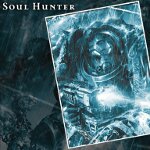 I wanted to review Soul Hunter for some time. Unlike my reviews of Pariah or the Dark Vengeance Novella, Soul Hunter is not a recent Black Library release. The book has been out for over two years and its sequels Blood Reaver and Void Stalker are available as well. However, Soul Hunter has been one of the most enjoyable Black Library books I’ve read in some time. Soul Hunter is Warhammer 40.000 fiction at its best.
I wanted to review Soul Hunter for some time. Unlike my reviews of Pariah or the Dark Vengeance Novella, Soul Hunter is not a recent Black Library release. The book has been out for over two years and its sequels Blood Reaver and Void Stalker are available as well. However, Soul Hunter has been one of the most enjoyable Black Library books I’ve read in some time. Soul Hunter is Warhammer 40.000 fiction at its best.
Soul Hunter: The Gold-Standard in Night Lords Fiction
Soul Hunter introduces and follows the travails of the ‘First Claw’ of the Tenth Company of the Night Lords Legion, led by the prophetically gifted (or cursed) ex-Apothecary Talos. Soul Hunter (and the entire Night Lords Trilogy by ADB) is not a Horus Heresy story, but a Chaos Space Marine novel set in the “contemporary” 41st Millennium of Warhammer 40K.
As we meet Talos and his First Claw, they and the entire Tenth Company, led by the enigmatic ‘Exalted’, are a heavily depleted band of survivors of the Long War; a pale shadow of the Company’s (and Legion’s) former might. As detailed by Black Library’s official cover-blurb, these Night Lords will partake in a Chaos assault on the Imperial System of Crythe. The attack is led by no other than the Despoiler himself.
The Night Lords form an uneasy allegiance with the Black Legion in order to assault the valuable planet of Crythe Primus. The Imperial world puts up a stern defense, but the biggest obstacle to success will be the disunity and mistrust between the two Legions. Will their covenant last long enough for them to succeed in their mission?
Why Soul Hunter is a great Book
Soul Hunter is a vicious page-turner. Here’s what makes it stand out from most Warhammer 40K and Space Marines fiction.
1. Brilliant Portray of the Night Lords Legion: Like many Space Marine novels, Soul Hunter uses human characters to portray the alien, inhumane nature of the Space Marines (much less Chaos Space Marines). Both in Soul Hunter and in short stories such as Savage Weapons, ADB has delightfully taken to the nocturnal theme of the VIII Legion and their Nostraman background, turning it into a highly unique story and setting.
The ‘Night Lords’ might be a slightly gimmicky concept straight from the box, but ADB really manages to make it work. He turns the darkness-obsessed Nostraman culture of Night Lords into one of the most disturbing and unsettling portrayals of Chaos Space Marines in any Black Library book.
2. Great, Multi-Layered Storytelling: Soul Hunter is not a Horus Heresy story. But it is a story detailing the eternal battle of remnants of a Traitor Legion, lost in the time-distortions of the Warp and the Eye of Terror, against the Imperium. One of the best things about Soul Hunter is how ADB ties in the “current” story line – the invasion of the Imperium’s Crythe system – with the Night Lords history and the events that chronicle them siding with Horus during the Heresy.
The book jumps back and forth in time between ’30K’ and ’40K’ quite a bit, not least to reveal the mystery behind the books title. Even more than that, I greatly enjoyed a dual near the end of the book, which may be less integral to the larger story, but is set-up by ADB to transcend the different “times” to bring closure to a fight spanning 10.000 years.
It is one example of how ADB manages to write pulse-pounding Space Marines vs. Space Marines action, yet still give it the extra “oomph” that makes it stand out from the literally hundreds of Black Library books detailing the battles of Space Marines that are out there.
3. Great Characters: Soul Hunter is a very popular book – allegedly ADB’s most successful yet – primarily because it really has a great set of characters. There is of course Talos, his First Claw and the two mortal servants of Talos that give the occasional ”human” perspective on events. But it goes beyond that.
Indeed, a significant part of the story revolves around the internal bickering in the alliance of Night Lords and Black Legions, as well as within the Tenth Company of the VIII Legion.
This wouldn’t work so well if not all the various characters were excellently drawn. The ‘Exalted’ leader of the Tenth Company, his Atramentar (roughly the 1st Company) bodyguard, the Black Legion Marines they have to deal with. Even the various Imperials who appear – often only for a chapter or two to give the reader a perspective from “the other side” – are all highly memorable.
This, in essence, is perhaps what I admire most about Soul Hunter. The story unfolds very naturally through the actions, behaviours and plans of the various characters, all of whom seem believable (in a Warhammer 40K context). This, above all, is what gives the Soul Hunter novel an excellent “flow”.
I give Soul Hunter a full 5 out of 5 stars. That does not mean the book is an attempt at high literature. Quite the opposite. I rate Soul Hunter so highly, mainly because it gives the reader lots of fun, heart-pounding 40K action, cool characters and an engaging story with plenty of surprises and twists that will keep you turning the pages.
Oh, one last thing. Soul Hunter really dials up the ‘grimdark’ (if that is it) in the final pages.
Nasty stuff.
Z.








